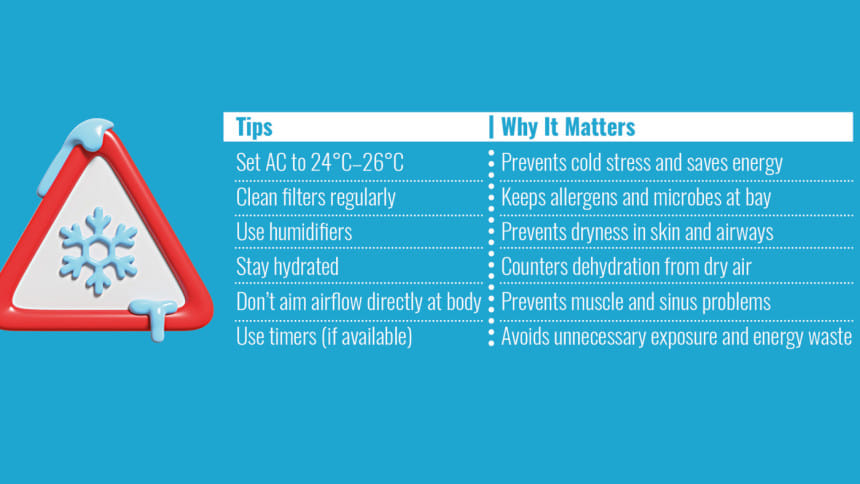Cool and careful: Mindful usage of AC for staying healthy

While AC offers undeniable comfort and respite from sweltering heat and rising humidity, improper or excessive use of air conditioners can come at a cost, especially to our health.
As we continue to embrace urban living and modern conveniences, it's important to understand both the benefits and drawbacks of air conditioning and how to use it wisely, particularly for individuals with special health conditions.
AC and your health
Air conditioners help regulate indoor temperature, reduce humidity, and improve air quality when maintained properly. But just like any appliance, the benefits hinge on responsible usage.
Pros
Relief from heat-related illnesses: AC can help prevent heat stroke, dehydration, and fatigue during extreme temperatures.
Better sleep quality and productivity booster: A cool, consistent environment aids in more restful sleep, especially during hot, humid nights.Studies show that people perform better cognitively and physically in cool environments
Improved air filtration: High-quality filters in AC systems can reduce allergens, dust, and pollutants, helpful for people with asthma or allergies.

Cons
Respiratory irritation: Overexposure to cold, dry air can lead to sore throat, nasal congestion, or aggravated asthma symptoms. "Babies and elderly people are more vulnerable to cold-related stress as their bodies are less able to regulate temperature. Asthma or COPD patients can experience constricted airways for sudden exposure to cold air," said Aysha Hasina, Paediatric consultant at a private hospital. She advised keeping the room mildly cool—not cold—and dressing babies in light, breathable clothes. For Asthma or COPD use HEPA-filter equipped ACs. Avoid sudden temperature changes by gradually adjusting thermostat settings. Many AC manufacturers are introducing new technologies to address certain health concerns. In Singer's 4-in-1 filter and HEPA filter provide maximum purified air by trapping very small particles, including dust, pollen, mould spores, and even some bacteria and viruses. This helps create a healthy environment for those with allergies, asthma, or other respiratory conditions, as well as for newborns.
Dry skin and eyes: ACs reduce indoor humidity, which can dry out skin, eyes, and mucous membranes.
Circulatory problems: For individuals with certain heart or blood pressure conditions, abrupt temperature changes between cool indoors and hot outdoors can strain the cardiovascular system. Sudden cooling can affect blood vessel function and heart rate for people with cardiovascular issues. Heart patients are advised not to move between extreme temperature zones abruptly. Wait indoors for a few minutes before stepping into the heat.
Infections and allergies: Poorly maintained units can harbour mould, bacteria, and dust mites, triggering allergic reactions or respiratory infections.
While AC use affects everyone, certain individuals need to be more careful. Don't let the cool air blow directly on your knees or shoulders, as prolonged exposure to cold air may worsen joint stiffness or pain to arthritis patients. For joint pain use a thin blanket or shawl if you're in AC for extended periods.
Healthy AC habits
Using air conditioners wisely can significantly reduce health risks while keeping the comfort intact. Here's how:
Set the right temperature. Keep the thermostat between 24°C to 26°C. Extreme cold not only increases energy bills but also puts stress on the body.
Use a humidifier or keep a bowl of water nearby as this helps counteract the dryness caused by ACs, maintaining optimal moisture levels in the room.
Ventilate regularly by keeping windows open during cooler parts of the day to let in fresh air and avoid air stagnation.
Clean filters regularly because dirty filters can worsen allergies and introduce bacteria into the air. Clean or replace filters every three months, depending on use.
Avoiding direct airflow is a thumb rule. Don't sleep or sit directly under the AC draft. It can cause muscle cramps, joint stiffness, or sinus issues.
Keep body hydrated. More cold, dry air dehydrates the body faster. Drink ample water to stay replenished.
Avoid running the AC all night. Use timers to shut it off a few hours into sleep or switch to energy-saving mode.
Air conditioners, when used with awareness and care, can be a boon, offering comfort, health benefits, and improved quality of life. But like all modern tools, their misuse can turn them into silent health saboteurs. Balancing convenience with caution is the crucial.

 For all latest news, follow The Daily Star's Google News channel.
For all latest news, follow The Daily Star's Google News channel. 



Comments